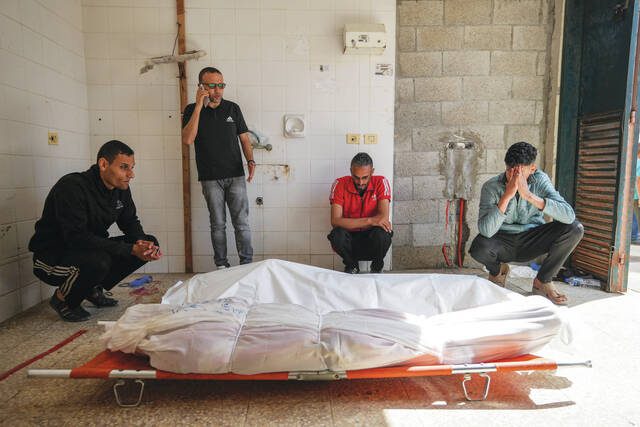A group representing Hamas went to Cairo on Saturday, and Egyptian state media said there was progress in talks to stop the fighting in Gaza. However, Israel has not sent a group, and a senior Israeli official played down the likelihood of the war ending completely, while emphasizing the commitment to invading Rafah.
Pressure has increased to make a deal to stop the nearly 7-month-long war. A top U.N. official says there is now a severe lack of food in northern Gaza, while the United States has repeatedly warned its close ally Israel about its planned attack on Rafah, the city on the border with Egypt where more than 1 million Palestinians are staying.
Egyptian and U.S. mediators have reported signs of compromise recently, but the likelihood of a deal to stop the fighting remains tied to whether Israel will be okay with the war ending without accomplishing its goal of destroying the militant group Hamas.
Egypt’s state-owned Al-Qahera News TV channel said that many disputed points had been agreed upon, but did not give details. Hamas has called for a complete end to the war and for all Israeli forces to leave Gaza.
A senior Israeli official, speaking anonymously about ongoing talks, downplayed the chances of the war ending completely. The official said Israel was committed to invading Rafah and would not agree under any circumstances to end the war in exchange for releasing hostages.
Israeli media reported that the statement had been given by Prime Minister Benjamin Netanyahu, whose government could be at risk if he agrees to a deal because hard-line Cabinet members want an attack on Rafah.
The proposal put forward by Egyptian mediators to Hamas sets out a three-stage process that would bring an immediate, six-week break in fighting, and would involve releasing some Israeli hostages and some sort of Israeli withdrawal. The first stage would last for 40 days, and would start with Hamas releasing female civilian hostages in exchange for Palestinian prisoners held by Israel.
Some families of hostages accused Netanyahu of prolonging the war for his political benefit. Daniel Elgert, whose brother Itzhak is held by Hamas, addressed Netanyahu at the latest rally in Tel Aviv: “Bibi, we call on you from here to announce the end of the war in exchange for the return of all the hostages. The war is effectively over, we know it’s over, you can’t fool us.”
The war has killed more than 34,000 Palestinians, according to Gaza’s local health officials, caused widespread destruction, and caused an unprecedented humanitarian crisis.
The conflict started on Oct. 7, when Hamas attacked southern Israel, abducting about 250 people and killing around 1,200, mostly civilians. Israel says militants still hold around 100 hostages and the remains of more than 30 others.
Israeli attacks on Gaza on Saturday killed at least six people. Three bodies were found in the remains of a building in Rafah and taken to Yousef Al Najjar hospital. A strike in the Nuseirat refugee camp in central Gaza killed three people, according to hospital officials.
According to Gaza's Health Ministry, 32 people who were killed by Israeli strikes have been taken to local hospitals in the past 24 hours. The ministry doesn't differentiate between fighters and civilians in its counts but states that women and children make up about two-thirds of the victims.
The Israeli military claims to have killed 13,000 militants, but has not provided evidence to support this assertion.
During its raids inside Gaza, the Israeli military has also carried out large-scale arrests. The territory's Health Ministry has urged the International Criminal Court to investigate the death of a Gaza surgeon, Adnan al-Borsh, who was working at al-Awda Hospital when it was stormed by Israeli troops in December, according to the Palestinian Prisoner’s Club.
The United Nations has cautioned that hundreds of thousands of people in densely populated Rafah would be at risk of death if Israel's military advances. This area is also a crucial point for humanitarian aid. Israel has briefed U.S. officials on its plan to evacuate civilians.
Cindy McCain, the director of the U.N. World Food Program, stated on Friday that civilians in the north, the most isolated part of Gaza, are suffering from a severe food shortage. McCain emphasized that a cease-fire and a substantial increase in the flow of aid through land and sea routes are crucial.
An Israeli humanitarian official disputed McCain’s claim on Saturday, stating that Israel has been assisting in the delivery of more aid. However, the official spoke anonymously due to the sensitivity of the situation.
Israel has recently opened new crossings to allow aid into northern Gaza. However, on Wednesday, Israeli settlers obstructed the first convoy before it entered the besieged area. Once inside Gaza, the convoy was taken over by Hamas militants before being reclaimed by U.N. officials.
Some displaced residents of northern Gaza reported that they have been missing meals and have not had access to vegetables for weeks.
Marwan Al-Zaid stated, “Now everything is scarce in Gaza. There are no vegetables, aid, or food packages. We receive food parcels about once a month.”
In the Israeli-occupied West Bank, where tensions have been high since the start of the war in Gaza, the Israeli military reported that it and Shin Bet had killed five fighters in Tulkarem on the grounds that the fighters had opened fire. Palestinian authorities stated that five people were killed by Israeli gunfire in the town of Deir al-Ghusun, approximately 7 kilometers (4.3 miles) northeast of Tulkarem.



